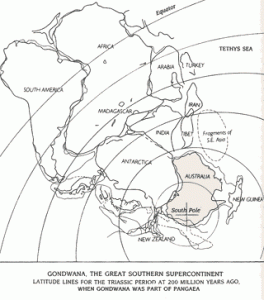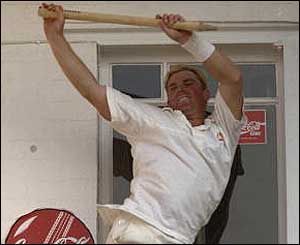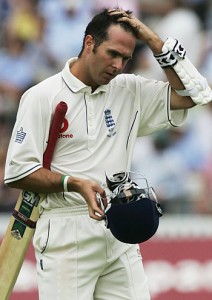
A gradual but inevitable descent into cricket-based loathing and bile.
Classic Series Review: 2005 Ashes, Part One (Lord’s)
Beating Australia in, well, pretty much anything, is all a bit passé these days. You name the sport and someone is rubbing Australian noses into the dirt in it. It wasn’t always thus though, and there was a time when Australian sports teams were universally regarded as being some sort of…non…giving up…sports guys. So it’s perhaps a little difficult to relate just how big the 2005 Ashes were. As in they were, like, really big. Massive even.
For the more observant amongst you, the above title must appear a misnomer. A single Test match does not a series make (although give the ICC a few years and it may well do). Whilst usually in our Classic Series pieces (such as this one) we tend to focus on, well, an entire series, we’ve decided to adopt a different approach here. It would be impossible to cover the entirety of the 2005 Ashes series in a single article, so instead we are looking back at that memorable series over a number of articles. Which is as good a way as any of avoiding having to write endless boring articles about Kevin Pietersen.
Since everyone is surely well aware of how events unfolded during the summer of ’05, rather than give a blow by blow account of what occurred we’re instead going to give impressions of each Test from a different personal perspective. It’s a rare day when we can gather everyone together at chateau 51allout at the same time, but for something as earth shatteringly important as reminiscing about the 2005 Ashes, special efforts (i.e. breaking parole conditions) were made. Appropriately enough our token Australian is first to take strike.
The first Test: normality asserts itself.
You often hear that Australia is a young country. It’s not true of course. Australian history is vaster than the usual span accorded to it by people who regard only the period since white settlement as relevant. It’s vaster even than the period covered since Aboriginal settlement (some 50,000 years ago for the curious). No, it’s far older than that. Australia has been in existence as an independent geological entity for an estimated 250 million years. From what we can gather, that’s in line with your typical Shivnarine Chanderpaul innings.

Australia: so bloody old even Richie Benaud claims to be somewhat sketchy about the details of its first few decades.
So what outsiders often regard as Australian arrogance and smugness, is really just an expression of the surety and conviction brought about by being immersed in an environment of overwhelming geographical certainty. What we’re trying to get at, in a roundabout way, is that Glen McGrath’s prediction of an Australian 5-0 whitewash of the 2005 Ashes series was not a statement born of typical Aussie hubris, but was actually a simple expression of geological time. For Australians, all things are constant, and the English being rubbish at cricket is as certain as tectonic uplift, erosion or David Warner shooting his mouth off in the media. In this vein, concerns over England’s impressive form in the lead up to the series, apparently strong batting lineup and even Justin Langer and Ricky Ponting getting twatted in the head during the course of Australia being bowled out for 190 on the first day, can be dismissed as irrelevant blips, inconsequential really in respect to the substantially longer timescales that Australians are accustomed to regard things.
As an Australian, everything about that first Test was predictable really, even our first innings debacle. Whilst we were accustomed, at the time at least, to beating our opponents into submission during the course of the first day and a half, granting Shane Warne plenty of time, once they had been suitably chastised and awed by the display of Australian batting might, to rout the rest. That usually gave plenty of time on the fifth day for gloating and the like. So whilst we were used to scoring a few more than the 190 runs that we mustered, at least they were accumulated at the typically brisk run-rate of 4.71. Considering that the game was being played at Lords, and McGrath was in the squad, that all meant that there would be just more time than usual to indulge in the traditional post-game celebrations.

The English press, predictably, completely misinterpreted Warne’s rendition of a traditional Australian dance of commiseration.
And of course everything from then went as expected. McGrath, using the infamous Lord’s ‘slope’ to his advantage, ran through English batting order in less time than it takes Boonie to down a case of VB (i.e. about four and a half minutes). McGrath took 5/53 and impressed all and sundry by being able to legibly write his own name on the famed Lord’s Honours Board afterwards. Admittedly the Australian second innings didn’t go quite to plan, in that an unseemly reliance was placed on middle order contributions from Damien Martyn, Michael Clarke and Simon Katich, when really Matthew Hayden and Justin Langer ought to have already bludgeoned the English bowlers into submission by then. And Ponting failed to make much of a mark either, failing to score the century he would have been yearning for so as to ‘stamp his authority on the series’, as they say in the classics. Instead he was dismissed on 42, at the hands of one of the substitute fielders the English snuck onto the field at regular intervals. Like most things, that particular absurdity was surely just a blip, one not likely to be repeated in many a geological epoch.
The English second innings was likewise not without its irregularities. Whilst most of the English batsman showed evidence of having read the script beforehand and fell for single digit scores, one in particular seemed to show a scant regard for the traditions inherent in an Ashes fixture, and in particular one staged at Lords, and hung around till the end, stubbornly refusing to give his wicket away. As much is to be expected from a South African really, but similarly it was not regarded with a great deal of concern, and this Kevin Pietersen chap, being surrounded by a team of Englishmen, was expected to conform to expectations before too long. It all seemed a bit inevitable really, the only long term escape possible from typical English mediocrity being if England packed their team with South Africans instead, but that hardly seemed likely. And in the short term Warne would surely have his measure, so there was no need for alarm.

Suddenly the idea of throwing it in and becoming a rubbish commentator appeared an attractive proposition to Vaughan.
In the end Australia won by 239 runs, and it all seemed to be very much the same old story. Sure, considering that Steve Waugh wasn’t present, some of the Australian sledging would have been understandably lacking in the sort of style and panache that we had become accustomed to, but that was a small concern in the grand scheme of things. Besides, this Simon Katich bloke seemed to be showing the signs of being able to harness the hatred towards anyone not Australian that’s always the sign of a good Aussie cricketer. Otherwise, watching the game from Australia, where games usually start at about 9pm and continue throughout the night, it rarely seemed necessary to follow the day’s play through to the end. It was just like the good old days when you could go to bed during the tea interval with absolutely no doubt as to what the score would be when you woke up the next day.
After this effort there seemed little point to following the rest of the series. We knew how it would all turn out. It was inevitable really.


No Comments
Post a Comment